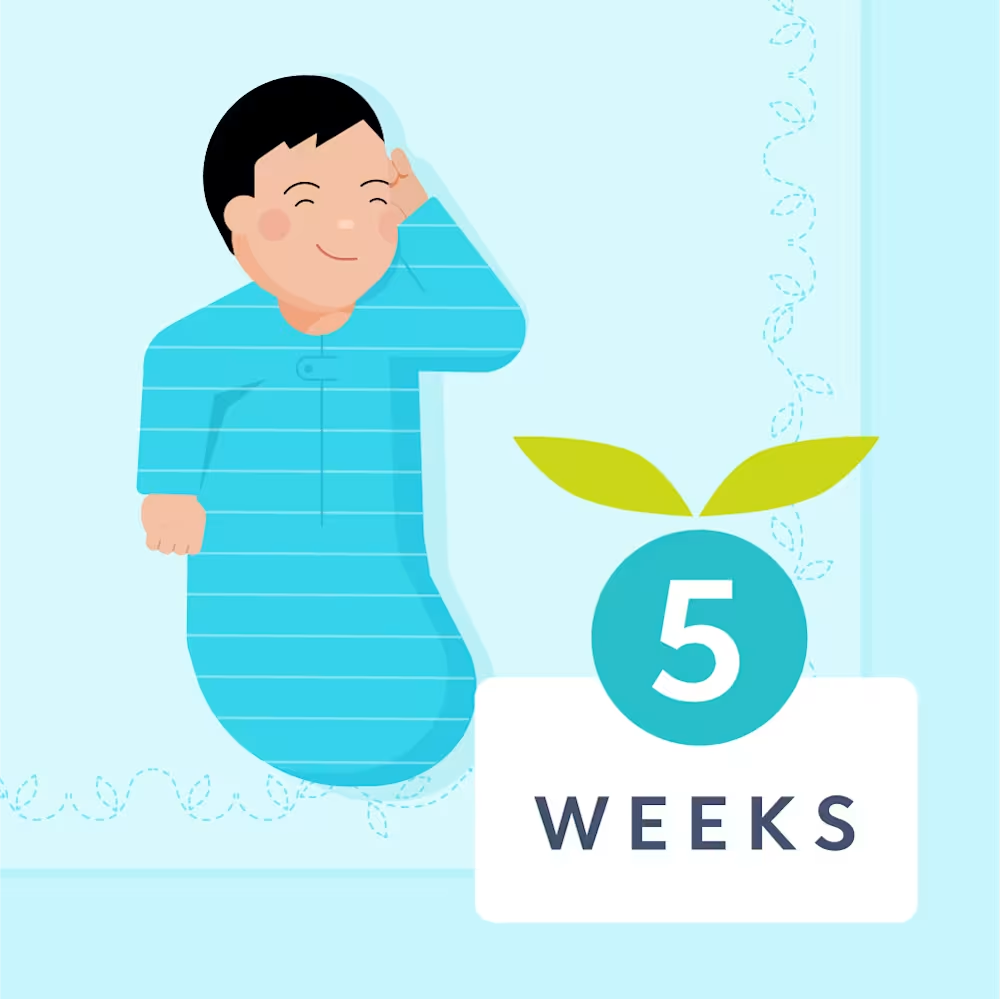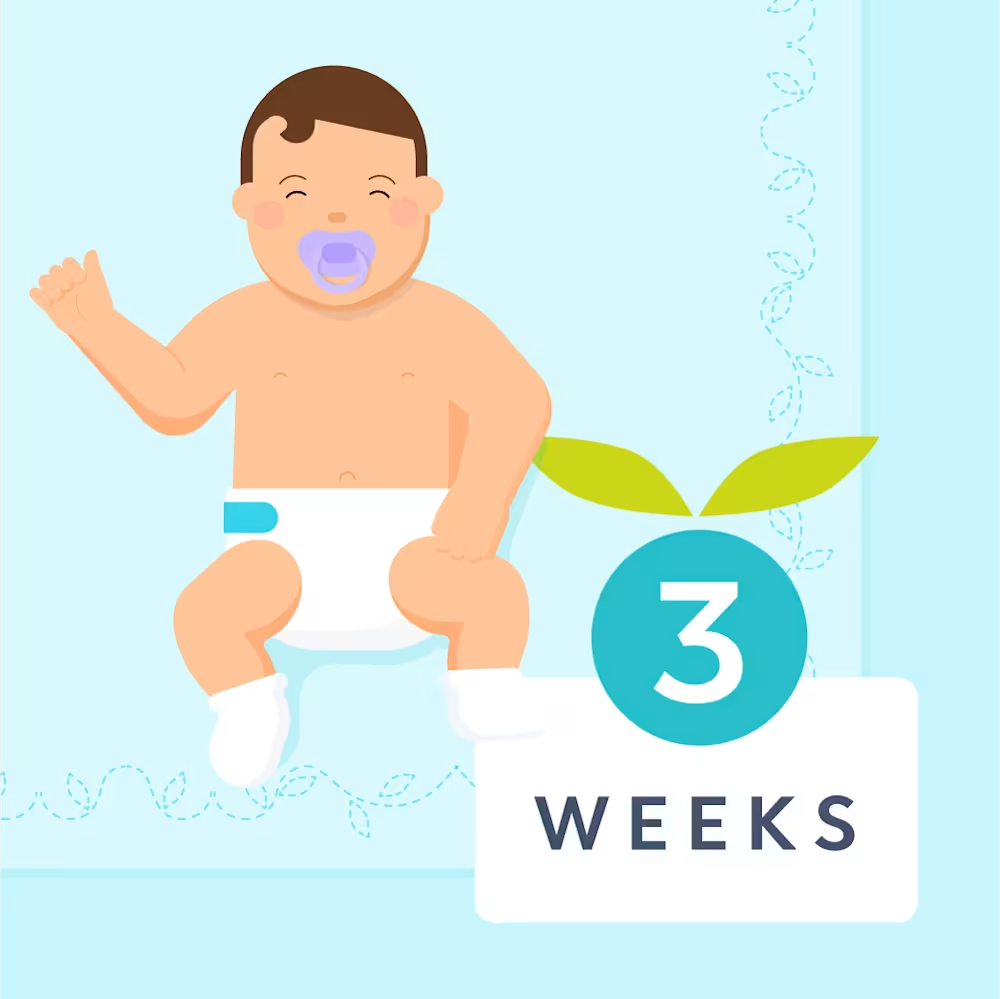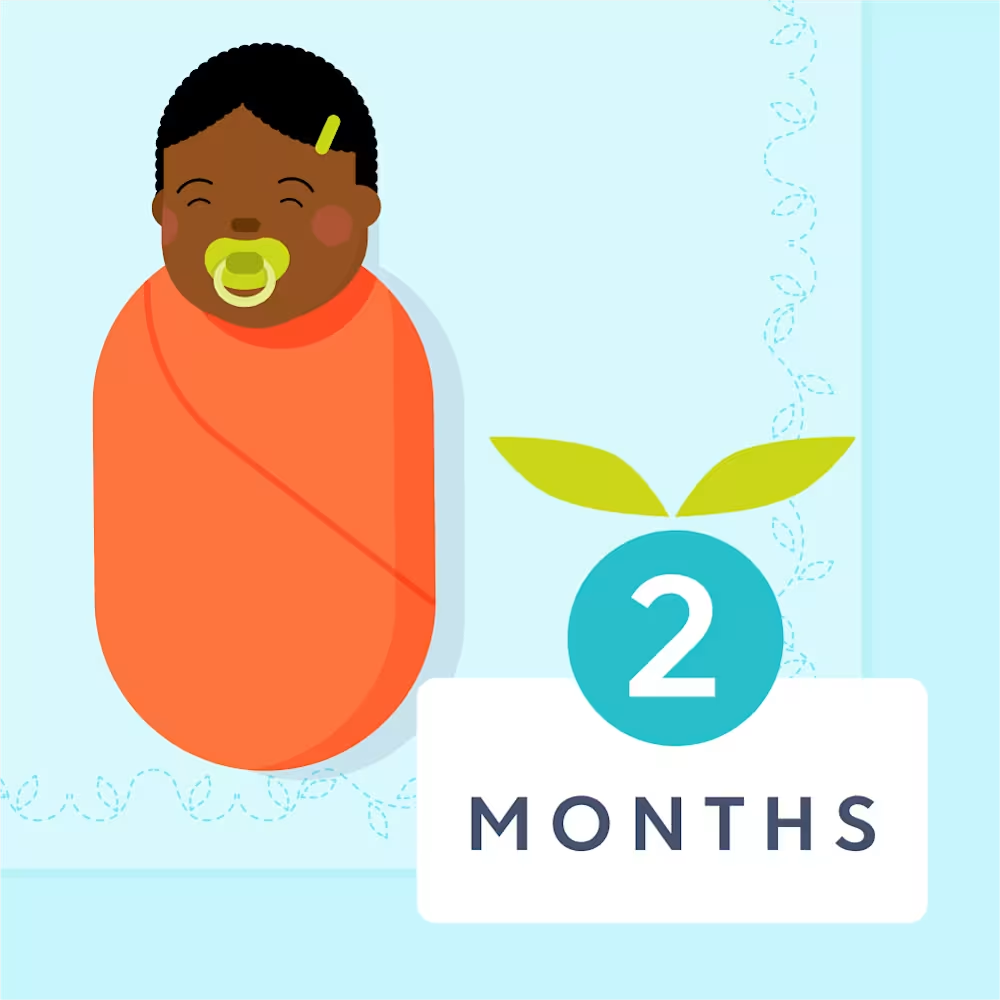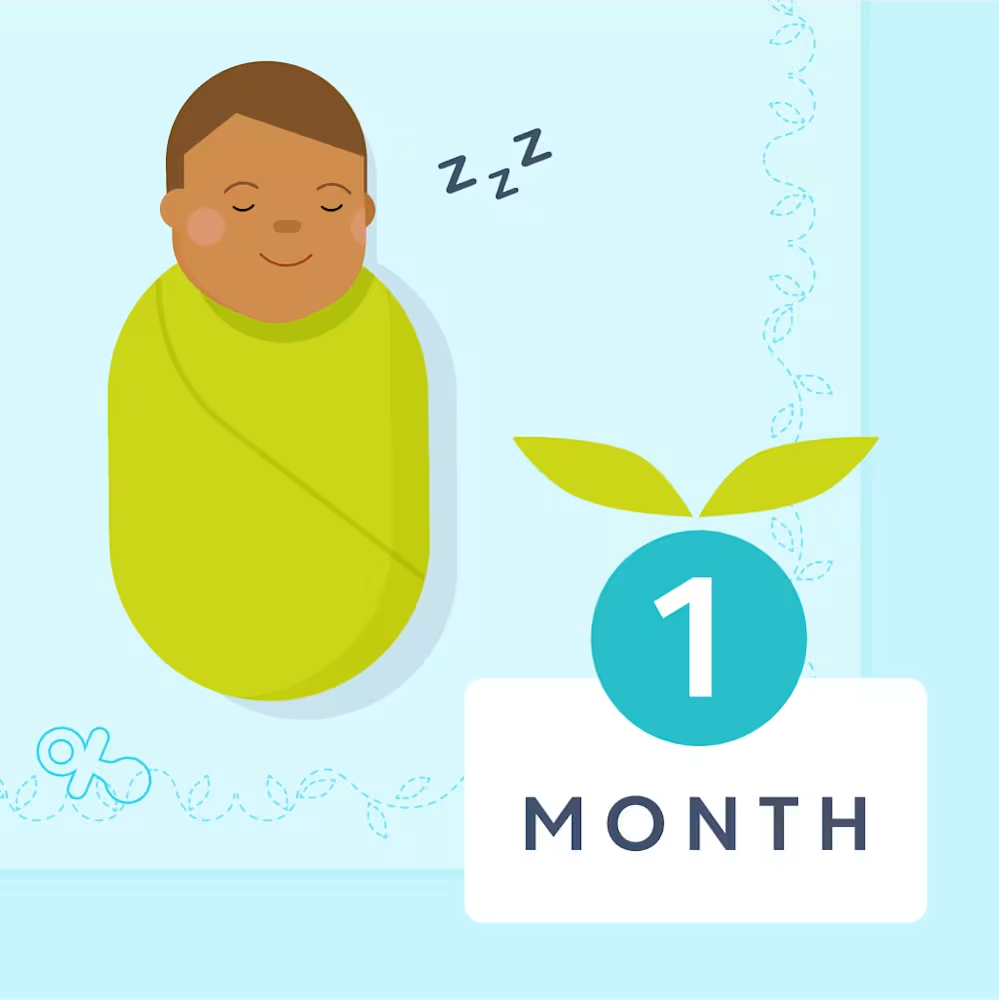7 week old sleep schedule: Bedtime and nap schedule
Updated Dec 15, 2025
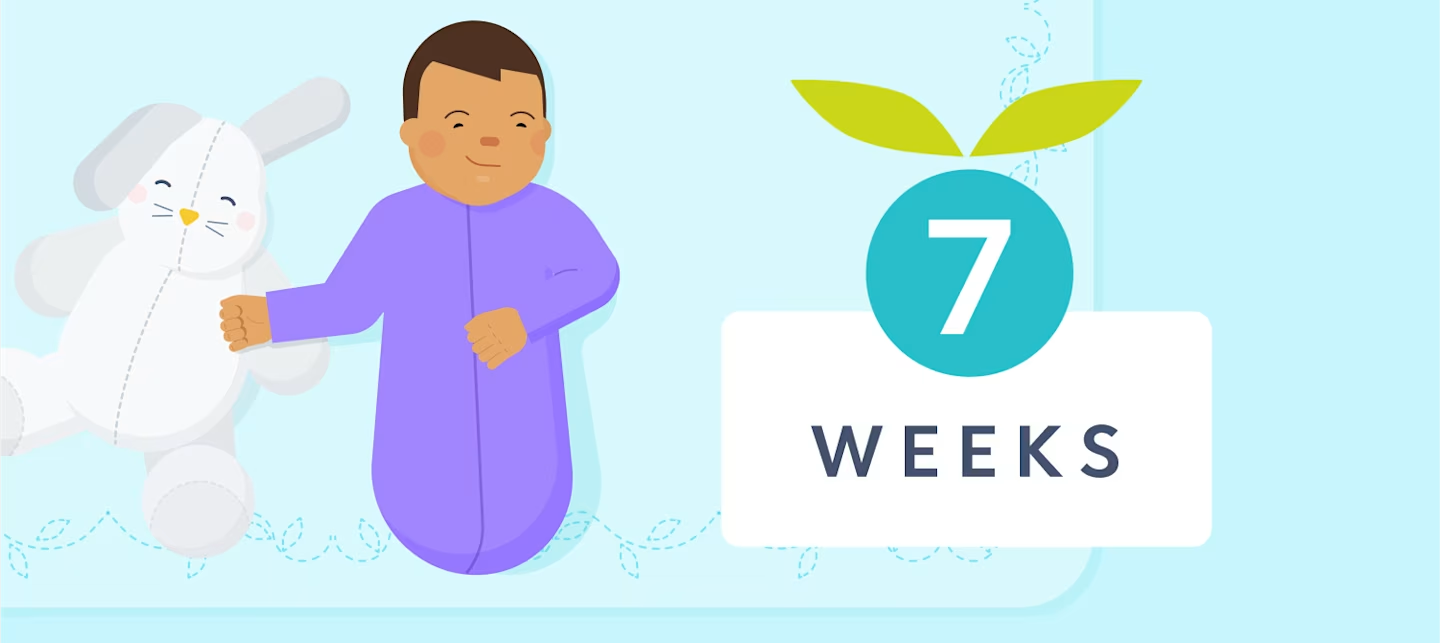
At 7 weeks you may find that sleep is still a bit unpredictable for your newborn. This is normal! While day/night confusion [] is likely improving at this age, most babies won’t have a more regular 24-hour cycle of sleeping and eating until closer to .
In the article, we’ll give you the lowdown on naps and bedtime at 7 weeks, give you a sneak peek of what you may expect when your baby is , and help you understand how to determine if your little one is currently getting enough sleep.
How much should a 7 week old sleep?
There’s a wide range of normal when it comes to babies and sleep. According to the American Academy of Pediatrics, newborns usually sleep for about 16 - 17 hours per day. [] However, at 7 weeks sleep is still likely pretty unpredictable. Naps may be long or short throughout the day — and that may change from day to day. It’s expected that newborns will continue to wake overnight for feedings and comfort. Babies typically aren’t on a regular 24-hour cycle of sleep and eating until closer to .
In the first few weeks of life, newborns can typically comfortably stay awake for around . Now that your child is nearing the 2-month mark, their wake windows may be a little longer. Most 2 month old babies can comfortably stay awake for , so we wouldn’t be too surprised if your baby starts to have slightly longer periods of awake time before needing more sleep. (Looking ahead, are typically 60 - 120 minutes.)
Note that it’s important to gauge your baby’s overall mood and energy levels when evaluating if they’re getting enough rest every day. There’s a broad spectrum when it comes to what’s healthy and normal for baby sleep and every child is different.
Here's a quick overview of what you may expect when it comes to 7 week olds and sleep. Note that these figures are averages and should be used as guidelines.
Sample schedule for 7 week olds
At 7 weeks, your little one's "schedule" will likely still be unpredictable. Sleep times and durations will vary and this is normal! Here's what a day in the life of a 7 week old newborn may look like:
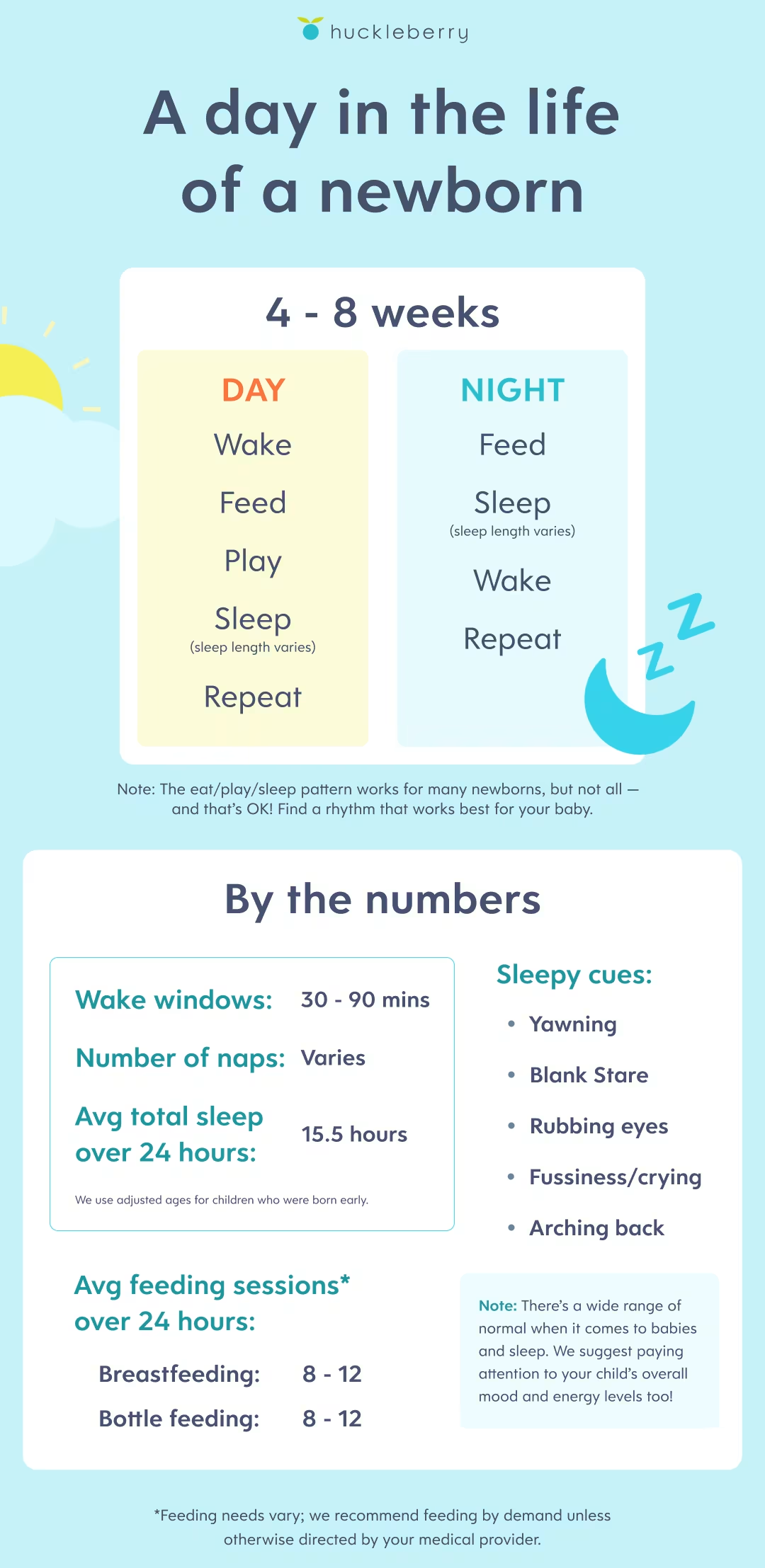
Top sleep tip for 7 week old
Now may be a good time to implement a consistent bedtime routine for your little one, if you haven’t already. Around 8 weeks [] is when day-night circadian rhythm appears and nighttime sleep may be a little more established. In other words, expect to start seeing a clearer separation between day and night sleep coming up. Instead of sleep being evenly distributed around the clock, you can expect a defined bedtime to start emerging, along with significantly more sleep at night than during the day. You’re almost there! Doing the same steps every night before bed (and even a condensed version before naps) can help signal to your baby that it’s time for sleep.
At 7 weeks, a doesn’t have to be complicated. For example, your bedtime ritual may include:
Breast milk or formula feed
Diaper change
Putting pajamas on
Snuggles
Other activities you could add include:
Bathtime
Reading a book
Singing a song
Swaddling (or a sleep sack)
Aim to do the same routine every time, in the same order. Even if you don’t have time to complete the full routine sometimes, it’s often better to do a instead of skipping it altogether.
Naptime schedule for 7 weeks
How long should a 7 week old nap?
Naps are going to still at 7 weeks, though it’s common to see 5 - 6 hours of daytime sleep spread over 4 - 5 naps around 2 months old. However, babies don’t have predictable or organized sleep cycles [] just yet so you may see some naps that are 30 minutes while others may be 2 hours. We recommend limiting each individual nap to no more than 2 hours in order to help regulate their schedule and help ensure there are enough feedings during the day. It can be helpful to focus on sleep totals over a 24-hour period, instead of aiming for a certain number or length when it comes to naps at this age.
You can also use and to help figure out when your baby may be ready to sleep again. At 7 weeks, your little one may be able to stay awake slightly longer now. Usually 1 month olds can comfortably stay awake for 30 - 90 minutes, while 2 month olds may be able to comfortably stay awake for 45 minutes - 1.75 hours. At 7 weeks, your little one may fit somewhere in those estimates, but keep in mind every baby is different and has different sleep needs.
Also, monitor your child’s sleepy cues when you think naptime may be approaching. If they’re rubbing their eyes, staring off into space, yawning, or starting to become fussy, these can be signs that your baby is ready to snooze. However, these signs can be fleeting and easy to miss. We suggest offering a nap if they’ve been awake for around 1.25 hours and haven’t shown sleepy signs.
How many naps for a 7 week old?
Babies aren’t born with predictable or organized sleep cycles [], which means sleep is still likely all over the place at this point. At 7 weeks, we don’t recommend trying to follow a as newborn sleep is generally controlled by sleep pressure and hunger. Some naps may be long while others may be quite short. However, as your little one nears , you may more regularly see around 4 - 5 naps totaling around 5 - 6 hours of daytime sleep.
Bedtime for 7 week olds
What time should a 7 week old go to bed?
Your baby’s longest stretch of sleep in a 24-hour period may start late — around 9:00 - 10:00 PM, or even later — since sleep schedules are still so irregular at this age. They may be ready for an earlier bedtime at around as they grow out of their irregular newborn sleep patterns and settle into a little more of a regular sleep and eating cycle.
In the meantime, it may be tempting to keep your little one up for longer stretches during the day at this age in hopes of an earlier bedtime, however, this can lead to . When your newborn is too tired, it can make it harder for them to fall asleep and stay asleep. Instead, aim to help your child stay well rested throughout the day and the earlier bedtime and more predictable schedule will come!
Why does my 7 week old keep waking up at night crying?
It’s completely normal for a 7 week old to wake multiple times during the night. At this stage, babies still need frequent feedings and comfort, so overnight wake-ups are expected. Most babies aren’t physiologically ready to sleep through the night until .
Is there a sleep regression at 7 weeks old?
At 7 weeks, babies don’t go through since their sleep is still quite irregular — there aren’t established patterns to regress from yet. If your little one’s sleep suddenly shifts, it’s usually due to things like , cluster feeding, or simply continuing to adjust to life outside the womb. It’s normal for a 7 week old to wake often, both day and night. Most babies won’t settle into more consistent 24-hour cycles of sleep and feeding until around 3 - 4 months.
Can my 7 week old sleep with a pacifier?
Pacifiers are generally safe to use at 6 weeks and can often be introduced from birth. If you're breastfeeding, the AAP recommends waiting until nursing is well-established — usually by around this point — before introducing a pacifier []. However, there’s limited evidence showing that early pacifier use causes “nipple confusion" [].
Beyond soothing your baby, pacifiers may also help reduce the risk of sudden infant death syndrome (SIDS). They’re commonly recommended for preterm or low-birth-weight infants to support the development of their sucking reflex [].
Should I swaddle my 7 week old?
Swaddling can be a great tool at this age to help your baby feel secure and promote better sleep. It's also useful in preventing the Moro reflex from startling them awake []., which can lead to longer sleep sessions.
Some things to remember when swaddling include:
Whether swaddled or not, always place your baby down on their back to sleep, in accordance with AAP safety guidelines [].
When swaddling, be sure your baby’s legs can bend up and out naturally. This "hip-healthy" swaddling reduces the risk of hip dysplasia [].
Stop using swaddles as soon as your baby shows signs of rolling over. This can occur as early as around 2 months.
Can I sleep train a 7 week old?
Sleep training for babies at 7 weeks. Newborns regularly need help from a caregiver to fall asleep and stay asleep! To help your baby and develop good sleep hygiene, try some of our .
Can a 7 week old sleep on their stomach or side?
The AAP recommends that all babies under 12 months be placed on their back to sleep on a firm, flat surface, as recommended by the AAP’s safe sleep guidelines []. At 7 weeks, avoid placing them on their stomach or side for sleep. Once your baby is able to roll comfortably in both directions (back to front and front to back), you can allow them to sleep in the position they choose without needing to return them to their back.
What are the developmental milestones for a 7 week old?
During of life, there are many exciting developments to watch for. These often include:
Steady weight gain after returning to birth weight by around 2 weeks
Brings hands toward eyes and mouth
Keeps fists clenched mostly
Displays newborn reflexes (rooting, sucking, Moro, grasping, and stepping reflexes)
Does a 7 week old need to eat during the night?
Newborns need to eat multiple times during the night at this age. A 7 week old's tiny stomachs can’t hold much, so they need to eat often — day and night. As they grow and can take in more at each feeding, longer stretches of overnight sleep may start to happen, though many babies continue to need nighttime feedings until around 6 months [].
Takeaway
We suggest aiming for around 15.5 hours of total sleep over a 24-hour period for 7 week old babies. Because newborn sleep patterns are still developing, you likely won’t see a predictable number of naps each day — some days will look different from others, and that’s to be expected!
At this age, babies can typically stay awake for 30 - 90 minutes at a time, though this can fluctuate throughout the day and from day to day. You may only have time for a feeding, diaper change, and a minute or two of tummy time before they're ready to sleep again!
If you find your little one likes to be awake for long stretches overnight, try keeping your child’s environment noisy and bright during the day and then quieting it down at night to set the tone for sleep. As much as possible, avoid stimulating or waking your baby when you feed or change them at night.
If you're curious about what lies ahead in the next month, glimpse into the future to see what you might experience once your baby is a . Take a look back at how far your baby has come by revisiting what they may have been like as a .
Share article:
Note: The content on this site is for informational purposes only and should not replace medical advice from your doctor, pediatrician, or medical professional. If you have questions or concerns, you should contact a medical professional.
9 Sources
Share article:
